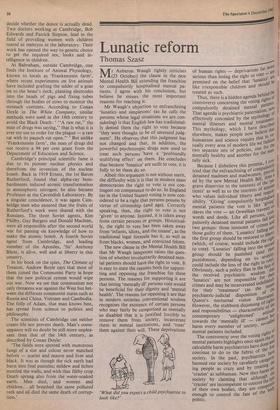Lunatic reform
Thomas Szasz
Mr Auberon Waugh rightly criticises (23 October) the clause in the new Mental Health Bill extending the franchise to compulsorily hospitalised mental pa- tients. I agree with his conclusion, but believe he misses the most important reasons for reaching it.
Mr Waugh's objection to enfranchising 'lunatics and simpletons' (as he calls the persons whose legal situations we are con- sidering) is that English law has traditional- ly denied them the right to vote because 'they were thought to be of unsound judg- ment'. He observes that this judgment has not changed and that, in addition, the powerful psychotropic drugs now used to treat such persons 'have a 'profoundly stultifying effect' on them. He concludes that because 'lunatics' are unfit to vote, it is folly to let them do so.
Albeit this argument is not without merit, the difficulty with it is that in modern mass democracies the right to vote is not con- tingent on competence to do so. In England (as in the United States) voting is now con- sidered to be a right that persons possess by virtue of citizenship (and age). Correctly speaking, then, the right to vote is not 'given' to anyone. Instead, it is taken away from certain persons or groups. Historical- ly, the right to vote has been taken away from 'infants, idiots, and the insane', as the traditional legal formula has it, as well as from blacks, women, and convicted felons.
The new clause in the Mental Health Bill that Mr Waugh lampoons raises the ques- tion of whether involuntarily detained men- tal patients should have the right to vote. It is easy to state the reasons both for suppor- ting and opposing the franchise for these persons. The reasons for supporting it are that letting 'mentally ill' persons vote would be beneficial for their dignity and 'mental health'. The reasons for opposing it are that in modern societies conventional wisdom recognises the existence of certain persons who may fairly be categorised as mentally so disabled that it is justified forcibly to remove them from society, incarcerate them in mental institutions, and 'treat' them against their will. These deprivations 'What did you expect a child psychiatrist to look like?' ore of human rights — deprivations far serious than losing the right to vote — are premised on the belief that
lunatics'
like irresponsible children and should be treated as such. Thus, there is whidden agenda behind thef controversy concerning the voting rights ° compulsorily detained mental patient: That agenda is psychiatric paternalisin, n° effectively concealed by the mythologY ° ' are mental illnesses and mental treatinests:, This mythology, which I have describe', elsewhere, makes people now believe di!' humanism and science require that in tually every area of modern life we fashl; two separate sets of policies, one for the mentally healthy and another for the Merl. tally sick. Because I disbelieve this pretnise' tend that the enfranchising of cornPu's":„.d. detained madmen and madwomen, 131.°': a ed by the new Mental Health Bill, do!' grave disservice to the interests of the 1: tients' as well as to the interests of anY0 0, who values individual liberty and resP°..A sibility. 'Giving' compulsorily hospitalise; mental patients the vote is like `giv1ll,.,50 slaves the vote — an Orwellian travestY "or words and deeds. Like all persons, pulsorily detained mental patients fa ifind two groups: those innocent of crimes a to those guilty of them. 'Lunatics' falling inrty the first group should be restored to libe,1 (which, of course, would include the rirrid to vote). 'Lunatics' falling into the seecicir group should be punished (and punishment, depending on its severtY,. could include the loss of the right to t Obviously, such a policy flies in the facthe ot the received psychiatric wisdom "r 'lunatics' are not responsible for t,e`b, crimes and may be incarcerated indeflollt for their 'treatment' (as the reethe psychiatric-judicial disposition Queen's nocturnal visitor illustratehts However, the stubborn disjoining of Idle and responsibilities — characteristic 01 ucie contemporary 'enlightened' attitbot towards the 'mentally ill' — cano°t,ad harm every member of society, 504'. mental patients included. hts Of The controversy over the voting lig- mental patients highlights once again the_,,' d calculable harm psychiatrists have done rie continue to do to the fabric of the I ve society. In the past, psychiatrists ha,s, harmed our society by cavalierly catego.Phe ing people as crazy and by treating olio 'crazies' as subhuman. Now they harm society by claiming that although fate 'crazies' are incompetent to control the 'efit of their own bodies, they are coniPetody enough to control the fate of the b politic.










































 Previous page
Previous page